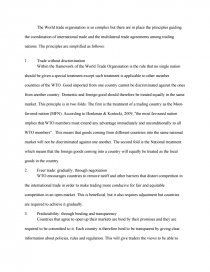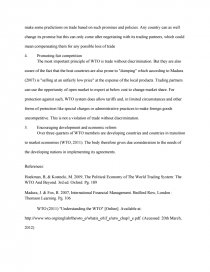The Principles of Trading System
Essay by Stella • July 6, 2012 • Essay • 523 Words (3 Pages) • 1,634 Views
The World trade organisation is so complex but there are in place the principles guiding the coordination of international trade and the multilateral trade agreements among trading nations. The principles are simplified as follows:
1. Trade without discrimination
Within the framework of the World Trade Organisation is the rule that no single nation should be given a special treatment except such treatment is applicable to other member countries of the WTO. Good imported from one country cannot be discriminated against the ones from another country. Domestic and foreign good should therefore be treated equally in the same market. This principle is in two folds: The first is the treatment of a trading country as the Most-favored-nation (MFN). According to Hoekman & Kostecki, 2009, "the most favoured nation implies that WTO members must extend any advantage immediately and unconditionally to all WTO members". This means that goods coming from different countries into the same national market will not be discriminated against one another. The second fold is the National treatment which means that the foreign goods coming into a country will equally be treated as the local goods in the country.
2. Freer trade: gradually, through negotiation
WTO encourages countries to remove tariff and other barriers that distort competition in the international trade in order to make trading more conducive for fair and equitable competition in an open market. This is beneficial, but it also requires adjustment but countries are required to achieve it gradually.
3. Predictability: through binding and transparency
Countries that agree to open up their markets are bind by their promises and they are required to be committed to it. Each country is therefore bind to be transparent by giving clear information about policies, rules and regulation. This will give traders the views to be able to make some predictions on trade based on such promises and policies. Any country can as well change its promise but this can only come after negotiating with its trading partners, which could mean compensating them for any possible loss of trade
4. Promoting fair competition
The most important principle of WTO is trade without discrimination. But they are also aware of the fact that the host countries are also prone to "dumping" which according to Madura (2007) is "selling at an unfairly low price" at the expense of the local products. Trading partners can use the opportunity of open market to export at below cost to change market share. For protection against such, WTO system does allow tariffs and, in limited circumstances and other forms of protection like special charges or administrative practices to make foreign goods uncompetitive. This is not a violation of trade
...
...

